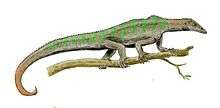Tanystropheidae
| Tanystropheidae Temporal range: Triassic | |
|---|---|
| | |
| Fossil of Tanystropheus longobardicus | |
| Scientific classification | |
| Kingdom: | Animalia |
| Phylum: | Chordata |
| Class: | Reptilia |
| Order: | †Protorosauria |
| Family: | †Tanystropheidae Gervais, 1858 |
| Genera[1] | |
Tanystropheidae is an extinct family of mostly marine archosauromorph reptiles that lived throughout the Triassic Period. They are characterized by their long, stiff necks formed from elongated cervical vertebrae with very long cervical ribs. Some tanystropheids such as Tanystropheus had necks that were several meters long, longer than the rest of their bodies.
Tanystropheids are known from Europe, Asia (Russia, China, and Saudi Arabia), and North America.[2] The presence of tanystropheids in Europe and China indicate that they lived along much of the coastline of the Tethys Ocean.[3] However, species in western North America are found in terrestrial deposits, suggesting that as a group, tanystropheids were ecologically diverse.[2]
Relationships among tanystropheid species have been difficult to resolve because most specimens were flattened during fossilization and are preserved two-dimensionally. Three-dimensional fossils are known from Europe and North America.[2]
References
- ↑ Fossilworks
- 1 2 3 Pritchard, Adam C; et al. (2015). "Late Triassic tanystropheids (Reptilia, Archosauromorpha) from northern New Mexico (Petrified Forest Member, Chinle Formation) and the biogeography, functional morphology, and evolution of Tanystropheidae". Journal of Vertebrate Paleontology. 35 (2). doi:10.1080/02724634.2014.911186.
- ↑ Rieppel, O.; Jiang, D. Y.; Fraser, N. C.; Hao, W. C.; Motani, R.; Sun, Y. L.; Sun, Z. Y. (2010). "Tanystropheus cf. T. Longobardicus from the early Late Triassic of Guizhou Province, southwestern China". Journal of Vertebrate Paleontology. 30 (4): 1082. doi:10.1080/02724634.2010.483548.


